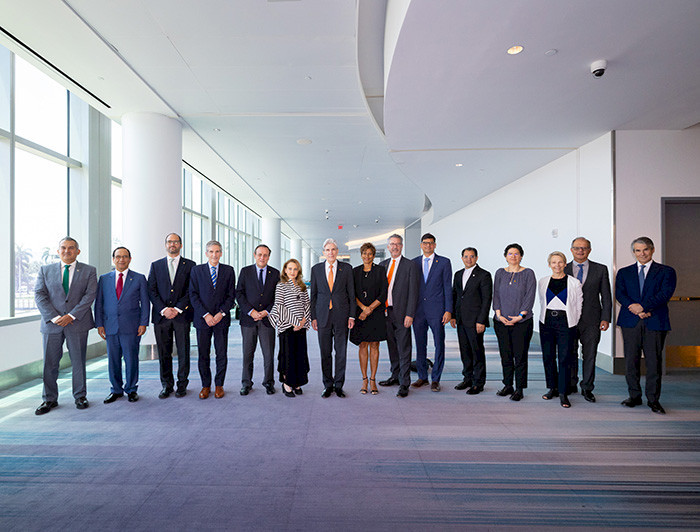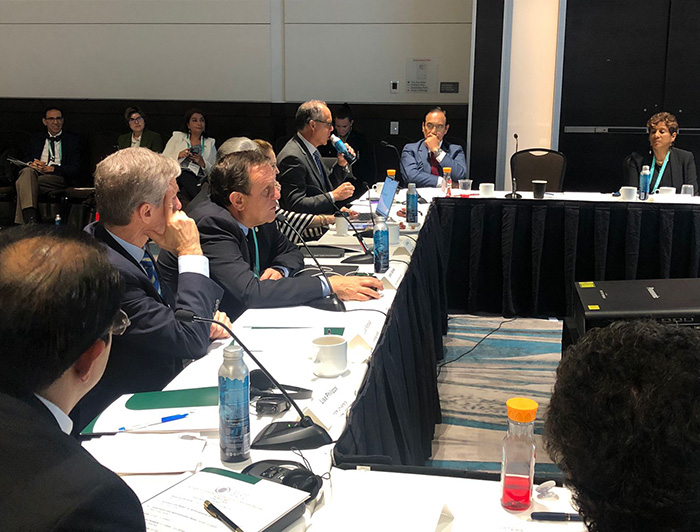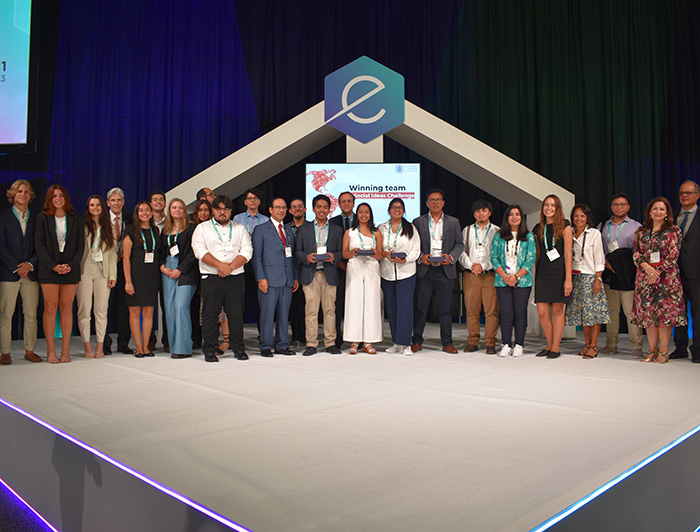UC Chile President Becomes New Head of Consortium of Leading Universities in the Americas
“It is an honor and a great responsibility to serve as president of the Hemispheric University Consortium, which faces growth and sustainability challenges in our university work,” said UC Chile President Ignacio Sánchez.

photo_camera The Hemispheric University Consortium was created five years ago and played an important role during the pandemic, when the member institutions collaborated and shared their experiences and best practices. (Photo: Hemispheric University Consortium)
The Hemispheric University Consortium (HUC), consisting of UC Chile and 12 other universities from Latin America, the Caribbean, Canada, and the United States, celebrated its fifth anniversary during a face-to-face general assembly in Miami.
This was the first in-person assembly since the beginning of the Covid-19 pandemic. At the meeting, representatives from all member universities discussed the achievements and challenges of the past year.
President Ignacio Sánchez was confirmed as the head of the consortium's new executive committee for the 2023-2025 period.
The committee also includes presidents from other universities, such as:
- Julian Rodriguez, President of Universidad Austral (Argentina)
- Rhonda Lenton, President of York University (Canada)
- Secilio Espinal, President of Pontificia Universidad Católica Madre y Maestra, (Dominican Republic)
- Enrique Castañeda, President of Universidad Peruana Cayetano Heredia (Peru)
“It is an honor and a great responsibility to serve as president of the Hemispheric University Consortium, which faces growth and sustainability challenges in our university work. In this session, we have been able to plan the development of the coming years and define major areas of work that will make a great contribution to our universities and to the countries and communities in which we operate,” said Sánchez.
President Sánchez also explained that the consortium is an important opportunity for collaboration given the high-quality of its members universities and their significant presence in the region.
He acknowledged the leadership of Julio Frenk, the current president of the consortium and the highest authority at the University of Miami.
"The consortium was created five years ago by an initiative of the president of the University of Miami, Professor Julio Frenk, who has been a key driver," said Sánchez.
"Along with academic and student exchange programs, there are lines of collaborative work in very relevant areas that have application in the region and that allow our faculty members to work together with a very important group of outstanding researchers."
About HUC

HUC, short for Hemispheric University Consortium, is an alliance of 12 universities across Latin America, the Caribbean, Canada, and the United States.
Its objective is to foster collaboration in higher education and contribute to the United Nations' Sustainable Development Goals (SDGs).
Throughout the pandemic, the consortium played a crucial role in promoting:
- international online collaborative learning,
- social entrepreneurship,
- SDGs,
- virtual research internships,
- the sharing of bibliographic resources through a network of libraries,
- and the exchange of good practices in response to the health crisis.
The Hemispheric University Consortium also aims to have a voice in shaping higher education policies in the region. By analyzing gaps in education, establishing lines of work, and addressing common challenges like ethics, interculturality, migration, and social cohesion, the consortium strives for greater quality and equity to benefit students and contribute to a better future.
Gabriela Gerón, the executive director of the Hemispheric University Consortium, emphasized the significance of this year’s general assembly.
For the first time since its inception, all member institutions were present, confirming their commitment to the consortium's continuity. UC Chile will hold the presidency for two years, followed by Universidad Austral (Argentina) for the next two years. Gerón expressed satisfaction with the meeting's outcomes and success.
Social Ideas Challenge Finals
The consortium's general assembly took place in Miami at the same time as eMerge Americas, a prominent technology event in Florida.
Venture capitalists, entrepreneurs, and technology innovators descended on the Miami Beach Convention Center for interactive exhibits, live workshops, talks, and product demonstrations.
This was the setting for the grand finale of the Social Ideas Challenge, an innovation and social entrepreneurship contest organized by HUC, in which five teams competed:
- UC Chile, which presented the "OstheoGlove” project, a technological glove, controlled by an app, that generates heat, stimulates muscles, and facilitates physical therapy exercises.
- Universidad Andrés Bello (Chile), which presented "O-Trash," a project that makes it possible to produce solid and liquid compost by collecting organic waste from the gastronomy industry.
- University of Miami (USA), which presented "After Hours Vendor," a project that uses vending machines to sell unsold food from local cafeterias and bakeries that would otherwise be thrown away at the end of the workday.
- Universidad San Francisco de Quito (Ecuador), which presented the "WASTY" project, a platform that connects companies with recyclers to increase recycling in Latin America.
- Universidad Peruana Cayetano Heredia (Peru), which presented the "HOUN" project, an application that links university students with room renters.

The team of biomedical engineering students from Universidad Peruana Cayetano Heredia was named the winner. The members of this winning team were: Cristina Aldana, Josep Melgarejo, Jennyfer Arismendiz, and Alvaro Aquije.
Gabriela Gerón expressed her satisfaction with the success of this year’s competition.
"We have managed to carry out a successful second edition of the Social Ideas Challenge where for the first time all teams were able to be present. We had multidisciplinary teams with highly innovative ideas that wowed our audience and consortium leaders."
She also announced future editions of the contest and invited other universities to participate in this event that is “preparing the social entrepreneurs of tomorrow.”


